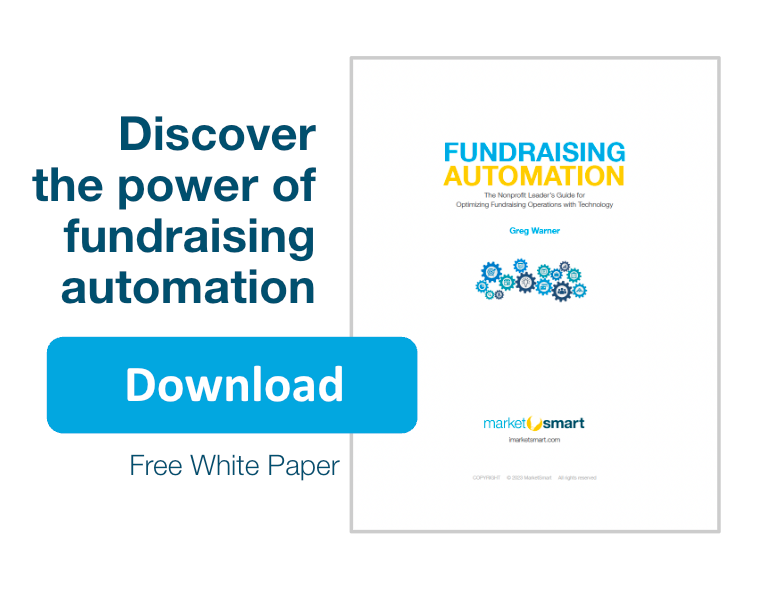Your job title as a fundraiser is part of the first impression you make with a donor.
Of course, you might be wondering, “Come on… does my job title really matter that much? I mean, who gives money to a nonprofit based on the job title of the fundraiser?”
Well, as it turns out, it matters quite a lot.
Your job title matters because, when your supporters begin to consider donating they often look for help, support, facilitation, guidance and assistance. If they are considering a small gift online (for instance), they’ll simply want it to be easy. However, as the amount they are considering increases, their need for help, support, facilitation, guidance and assistance grows.
Once they realize they have that need, they’ll look for someone to step in with a job title that reflects what they’re seeking. Then, if your job title doesn’t align with their needs, they’ll sense an incongruity that could get in the way of their decision-making momentum. You don’t want that!
Look, in situations related to large financial decisions and transactions hi-value supporters (with capacity) expect service. You do too! In those situations, both you and your supporters want someone to be there to help provide information, encouragement and reassurance.
The Sage
If you are a fundraiser involved in raising mid-level, major or planned gifts, your job is to guide, lead, and challenge donors to make transformational gifts that connect with their identity and help them advance their personal hero story. That makes you their Sage.
Here’s another way to look at it. In classic literature, there are twelve character archetypes including the Sage, and those archetypes can be applied to fundraising stories.
Sages support heroes by helping them make decisions for themselves and for the greater good. Heroes look to their Sages for that kind of support. That’s why you want your donors to perceive you as such.
You don’t want them to see you as a quota-meeting sales specialist or just a collector of funds. And you certainly don’t want them wondering how you can help them. That adds friction to the consideration process.
Yet, all of this shows up in a job title.
That’s why Dr. Russell James tested 71 different fundraiser job titles to see how donors reacted to them, as well as their effects on actual giving. The results were strikingly informative.
Let’s look at the worst ones first.
The 6 Worst Job Titles for a Fundraiser
Based on donor data and feedback, here are the six worst fundraiser job titles. See if you notice a trend.
- Director of Advancement
- Chief Advancement Officer
- Director of Development
- Chief Development Officer
- Director of Institutional Advancement
- Chief Institutional Advancement Officer
From a donor’s perspective, this is an uninspiring list, to say the least.
Notice the common words: officer, advancement, institutional, development.
What sort of person uses those kinds of words?
Answer:
The administrator.
Although, if you take a donor’s point of view you’ll see the administrator as the Villain in the story.
Remember, donors want to see themselves as heroes in their own life stories. Sages help them. Administrators (also known as overhead to many donors) don’t. Rather, they collect the money and put it to use. “But at what cost?” the donor often wonders. Sometimes they might even ask their Sage (the fundraiser) to answer that question.
See how that works? They think of Administrators and Administration as a cost — a necessary evil. A Villain.
What’s Wrong With This Picture?
Inside your organization, those kinds of words (sort of) describe what a fundraiser does, and who they do it for. The gift officer serves the institution, and helps it advance.
That’s fine for insiders. But it’s not a good idea to try to impose that perspective on donors. These are bureaucratic words. Office words. Workplace words. Cold words. Mechanical words.
Using them while communicating with supporters or donor prospects essentially tells them that their values, interests, or priorities don’t matter very much, or at all. Instead, what matters is the organization or institution and its needs and priorities. As a result, they get in the way of fundraising.
So, Don’t Use Them!
These are not Sage words. Transformational words. Emotional words. Inspiring or uplifting words.
No one gets excited about meeting someone with these sorts of job titles, except other people with those same titles (at a conference) and administrators.
You can do better. Much better.
Best Job Titles for Fundraisers, Especially Gift Officers
Here are two of the top ten job titles Dr. James researched:
- Director of Donor Guidance
- Director of Donor Advising
In fact, every single one of the top ten job titles included some variation of the words ‘guidance,’ ‘advising,’ or ‘planning.’ And these results held true regardless of age, gender, or how much money donors gave.
These terms resonate with everyone.
Except administrators.
Why Do These Job Titles Connect So Well With Donors?
For the reasons already given. Remember — fundraisers are Sages, and people like sages.
They like to be led, guided, and empowered by someone they know, like and trust. They like to know they are in good hands. Perhaps this is why personal investment professionals go by the title ‘financial advisor,’ instead of ‘financial officer.’
Whatever you choose to call yourself, make sure your title uses at least one of those three words. You are offering advice, guidance, and planning. Make it official. Put it in your job title.
Beyond the Title: How Should You Describe Your Job to a Donor?
Now that you know how to improve your job title, let’s consider how you should describe what you do for others too? After all, your job title is just the beginning.
Most LinkedIn profiles require a job description. And most donors will look it up before they meet with you. So it’s a good idea to think carefully about a one or two-sentence description of how you help donors.
To do this well, you want to think along the same lines as with the job title. You’ll want to consider your donor’s perspective.
Here are some sample phrases to get you thinking about what you do in ways your supporters will appreciate:
- I show supporters how to give smarter
- I help supporters plan out their gifts and the impact they want to make
- I meet with supporters like you to learn more about them and determine if our cause might be a good fit for them, from a philanthropic perspective
- I help people donate weird assets
- I teach supporters how to get special tax benefits
- I show supporters how to make gifts that pay them income for life
When asked how you achieve all this, you could say something like this:
“I help our donors plan their gifts to make the impact that’s most meaningful for them. We work through what they care about. We discuss what’s been important in their lives. Then we connect that with possible projects that reflect their values and fit into their life story. This lets them use their money in a way that’s more meaningful than just consuming more stuff.”
This is the language of an ally — a Sage. Someone who can lead a donor where they already want to go. That’s why they’re meeting with you in the first place. They want to give. They want to learn more. They want to see what’s possible, and how much they might want to commit.
Never forget that you do this every day. You help people like them give away their hard-earned money.
They don’t!
In most cases, they spend their time accumulating or managing wealth. And that’s why they are looking for a Sage.
Therefore, if you position yourself as someone who will guide them into a giving experience full of meaning, value, self-worth, and fulfillment, they will go with you as far as you can take them.
Related Resources
- Why fundraiser job titles suck and cost you a lot of money!
- The 8 core components of engagement fundraising and why you desperately need them
- Testing the Effectiveness of Fundraiser Job Titles in Charitable Bequest and Complex Gift Planning
- The Fundraising Myth & Science Series, by Dr. Russell James





